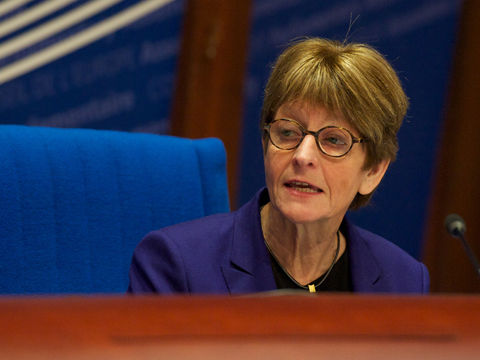PACE puts dialogue first to solve Nagorno-Karabakh conflict

By Mushvig Mehdiyev
The Parliamentary Assembly of the Council of Europe is trying to reconcile Armenia and Azerbaijan knowing fully well that it is not an easy task to achieve, said the assembly's top official.
In line with its approach towards the conflict in Nagorno-Karabakh, the PACE considers that building a sustainable dialogue stands at the basis of any breakthrough should the belligerents ever hope to find answers to their questions, said Anne Brasseur, PACE president.
"I have tried to reconcile the sides whenever I visited the conflicting countries. Of course, I understand well how difficult and complicated it is to achieve. But I believe and reiterate that the only solution is dialogue," Brasseur said.
When it came to impose sanctions on Armenia, Brasseur said it was sometimes necessary to impose sanctions, but building a dialogue was far more important.
Earlier in April, Baku said it was necessary to develop particular mechanisms to force Armenia to peace, including the imposition of sanctions in view of Armenia's refusal to adhere to peaceful efforts. Baku believes that Yerevan has ignored all its commitments taken under Madrid Principles, Budapest document, Helsinki Final Act and the UN resolutions.
Brasseur's comments on the issue of IDPs and refugees reflected PACE's obvious concerns as she called the outcomes of forcible displacement "unacceptable".
"The situation of refugees and internally displaced persons within a country is unacceptable for the PACE. We should condemn strongly the conflicts that hit our member countries and lead to the increase of the number of refugees and IDPs," she said.
Demonstrating solidarity with all those who have become refugees as a result of violence and political reasons is what the world needs today, believes Brasseur.
Armenia's invasion into Azerbaijani lands that started in the early 1990s and is still ongoing today resulted in the death of more than 20,000 Azerbaijanis. Additionally 50,000 people were injured and over one million were displaced. The total cost of the damages inflicted by Armenia's aggressive policy against Azerbaijan stands at $300 billion, according to the State Commission on Prisoners of War, Hostages and Missing Persons.
Brasseur avoided voicing her clear stance when she was asked about paying a visit to Khojaly genocide memorial during her visit to Azerbaijan, expressing her view by "honoring the memory of victims of violence and aggression".
"I visited Azerbaijan twice last year, and I do not have a meeting scheduled for the near future. But I repeat that I honor the memory of those who have fallen victims to violence and aggression, because aggression could never be an answer in any case," she concluded.
In Khojaly, Armenians massacred over 613 Azerbaijanis in 1992 in just one night. It was declared a genocide in Azerbaijan and recognized by numerous countries across the world.
Azerbaijan's internationally recognized Nagorno-Karabakh territory was turned into a battlefield and zone of aggravated tensions after Armenia sent its troops to occupy Azerbaijan's lands in the early 1990s. As a result, 20 percent of Azerbaijan's internationally recognized territory stands under military occupation of Armenia.
For the past two decades, and despite calls from the international community, Armenia has refused to withdraw its troops and retreat within its national borders.
- - -
Follow Mushvig Mehdiyev on Twitter: @Mushviggo
Follow us on Twitter: @Azernews
